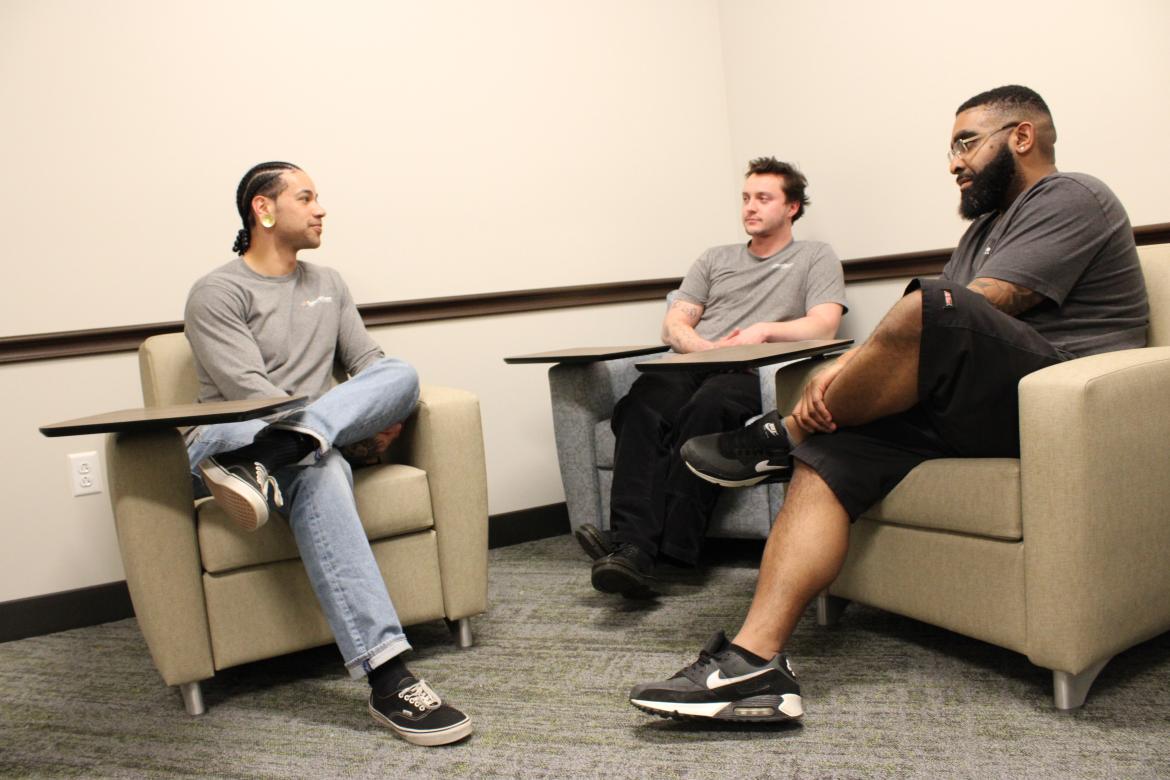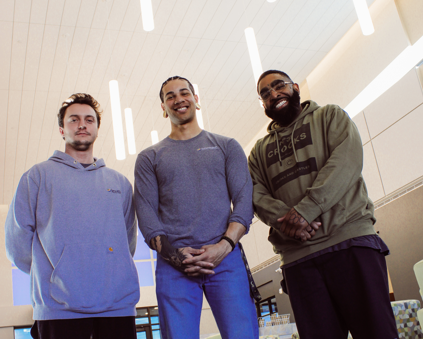When things are grim, keep faith: The full-circle story of one man’s journey from substance use to changing lives
Terrell Keith and the SummitStone Health Partners peer specialist team at Longview are in the business of ‘fostering hope’
With his kind smile, tall stature, and unmistakable gold ear gauges, you can’t miss Terrell Keith. In fact, it seems that his name and positive impact are familiar to many people in the behavioral health and substance-use world in Larimer County.
Yes, Keith grew up in this community, so there’s a longevity factor. But what makes his relative renown remarkable is that he never planned to do the life-changing behavioral health work he does today.
“This always felt like sort of an impenetrable field,” he said, and one that “came out of left field” for the restaurant server-turned-supervisor of peer support specialists for SummitStone Health Partners.
Sitting in a sunlit conference room, on the second floor of the taxpayer-funded Acute Care facility at Longview campus where he works, Keith talks easily and openly about his challenges with substance use and recovery. This is inspiring but not unexpected, as his experiences are integral to serving clients as a peer specialist and leading a team of those who do the same.
“The main thing peer specialists do is foster hope. If we don’t do anything else, that’s what we do. We give people a glimpse of what’s possible.
“We transmute our own trauma to help others,” Keith said.
Drugs, psychosis, and self-love
Keith grew up a young gay, Black man in a single-mother home in southeast Fort Collins.
On the surface, people saw a successful student with a 3.8 GPA. Diving deeper, they would find a high school junior who struggled with feelings of being “other than, less than” because of his intersectional identities in a predominantly homogenous community.
After taking his first sip of vodka, he discovered those feelings went away. That catapulted him into an abuse of alcohol and cocaine and meth, and an upended reality in which he “barely graduated with lots of help” from others.
Between the ages of 19 and 22, he was getting kicked out of houses, going to meetings, relapsing, and trying over and over to get sober. The solution was clear, but he wasn’t yet ready to “give up old ways.”
Primarily using meth, the now-21-year-old began to see and hear things. On April 11, 2020, he went to jail while in drug-induced psychosis. That was a catalyst.
“After getting arrested, everything clicked,” he said, snapping his fingers.
The things people had been telling him for years finally stuck. He went through withdrawal management, also known as detox, and said loving goodbyes to old associations that kept him tethered to that world.
“Getting clean turned out to be the simple part,” he said. The hard part was learning to love himself. Being confident. Letting go of shame.
From recovery to resiliency
Keith’s story is about more than one person’s journey. It exemplifies Larimer County’s interconnected and collaborative strengths, and how an investment in behavioral health five years prior can have long-term impacts.
The Homeward Alliance is a Colorado-based nonprofit that empowers individuals and families facing homelessness. It manages numerous programs, brings together community partners, and provides services at the Murphy Center for Hope in north Fort Collins.
During the COVID-19 pandemic, Homeward Alliance Development Director Pam Brewer remembers getting an email from Larimer County with an invitation to apply for a Behavioral Health Services Impact Fund grant. Behavioral Health Services stewards the sales-use tax dollars for behavioral health, approved by voters in 2018, and has awarded $14.7 million in grants to 72 organizations since 2019.
Homeward Alliance received a grant to fund a peer navigator to connect clients with resources. This position was particularly critical when the organization was trying to serve people who were unhoused or insecurely housed – at a time when public health guidance was for people to isolate at home.
These individuals were surviving day to day. They were at higher risk of getting COVID because of chronic health conditions. They struggled to get food, stay warm, maintain friendships and relationships without the privacy of home, and access behavioral health care – all with the added layer of social distancing.
“Losing connection (to their support services) was just one more loss, when they’ve already lost so much,” Brewer said.
“When you’re trying very hard to make gains in your life, and get treated for high blood pressure or finally find the courage to talk with a counselor about trauma, it is discouraging when that connection is cut,” she said. It’s another setback when they may already feel judged, looked down upon, or stigmatized by others in the community.
Because of the Impact Fund grant, the peer navigator was able to provide what Brewer said were “life-saving” support for “many many people.”
Asked if it was possible to talk with that peer navigator to hear their story, Brewer pointed to Terrell Keith, in a serendipitous small-world moment.

Keith was about six months sober when a friend encouraged him to apply for the peer navigator position with Homeward Alliance. He dedicated himself to building partnerships with other professionals and organizations within the substance-use and mental health community, so he could best serve his clients.
They were sex workers, people who didn’t know how to live “without substance use wreaking havoc on their lives,” members of the LGBTQIA+ community who are at greater risk of being unhoused, and those experiencing homelessness.
“I learned so much from those clients, and I think they learned from me,” said Keith, ever humble.
In particular, he remembers two separate clients, whom he drove to withdrawal management or treatment “probably 10 times each.” It was hard to see them actively struggling for so long.
One day, though, after months of no contact, he saw them walking into the Murphy Center together. They had met in treatment, were sober, and looked like “different men entirely.”
“Seeing those two meant everything,” said Keith, who reminds himself to keep faith, even when things look grim.
The winding path to Longview
After leaving his position with Homeward Alliance, Keith stayed in the behavioral health field, working for different organizations in the region. After connecting with a recruiter from SummitStone, he joined the AcuteCare team in August 2023. The experience was surreal, he said, setting up a team of peer specialists who would serve clients at the new facility that opened on Dec. 2, 2023.
He oversees nine peer specialists and is hiring for more, as of February 2025. All people with personal, or lived, experience with drugs and alcohol, the peer specialists connect with clients and help them navigate their treatment and recovery.
“If it wasn’t for other people who had walked a similar path,” Keith doesn’t think he would be where he is today – five years sober and thriving in a field that helps others. “I needed a teacher in that way.”
Asked what he wishes others knew about the work of peer specialists, Keith said: “The respect we get is the respect that clients on the unit should get.” They are a whole person, he said, who isn’t defined by their substance use.
Looking back, Keith said it’s a privilege to work at the Longview campus, a place where people can get incredible care that he didn’t have access to in jail.
“It makes me feel like we’re in a community, rather than just a location,” he said. “For taxpayers to put money on it is a really tangible way to support it.”
He knows that it can be scary or overwhelming, to reach out for help, and encourages people to start by calling SummitStone Health Partners’ crisis line at 970-494-4200 ext. 4. Talking to another human being, and hearing the care they have for others, is what he hopes will encourage people to go to Acute Care at Longview campus to get the support they need.
“A facility is only as good as its people,” and he thinks the team at Longview is pretty incredible.

Madeline Novey
Communication Specialist
Behavioral Health Services
970-619-4255
noveyme@co.larimer.co.us
